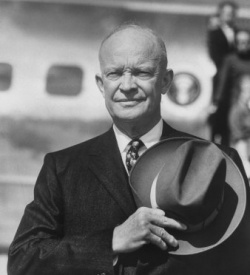Dwight D. Eisenhower’s “Military Industrial Complex” Farewell Address

Dwight D. Eisenhower’s “Military Industrial Complex” Farewell Address
Folks, I urge you all to take it upon yourselves to teach yourselves the tools of learning and then study and understand history and what people like Kennedy and Eisenhower were talking about, then compare those warnings with todays reality.
Here are the main points of Eisenhower’s farewell address and warnings:
This conjunction of an immense military establishment and a large arms industry is new in the American experience. The total influence — economic, political, even spiritual — is felt in every city, every State house, every office of the Federal government. We recognize the imperative need for this development. Yet we must not fail to comprehend its grave implications. Our toil, resources and livelihood are all involved; so is the very structure of our society.
In the councils of government, we must guard against the acquisition of unwarranted influence, whether sought or unsought, by the military industrial complex. The potential for the disastrous rise of misplaced power exists and will persist.
We must never let the weight of this combination endanger our liberties or democratic processes. We should take nothing for granted. Only an alert and knowledgeable citizenry can compel the proper meshing of the huge industrial and military machinery of defense with our peaceful methods and goals, so that security and liberty may prosper together.
Akin to, and largely responsible for the sweeping changes in our industrial-military posture, has been the technological revolution during recent decades.
In this revolution, research has become central; it also becomes more formalized, complex, and costly. A steadily increasing share is conducted for, by, or at the direction of, the Federal government.
Today, the solitary inventor, tinkering in his shop, has been overshadowed by task forces of scientists in laboratories and testing fields. In the same fashion, the free university, historically the fountainhead of free ideas and scientific discovery, has experienced a revolution in the conduct of research. Partly because of the huge costs involved, a government contract becomes virtually a substitute for intellectual curiosity. For every old blackboard there are now hundreds of new electronic computers.
The prospect of domination of the nation’s scholars by Federal employment, project allocations, and the power of money is ever present and is gravely to be regarded.
Yet, in holding scientific research and discovery in respect, as we should, we must also be alert to the equal and opposite danger that public policy could itself become the captive of a scientifictechnological elite.
It is the task of statesmanship to mold, to balance, and to integrate these and other forces, new and old, within the principles of our democratic system — ever aiming toward the supreme goals of our free society.
Another factor in maintaining balance involves the element of time. As we peer into society’s future, we — you and I, and our government — must avoid the impulse to live only for today, plundering, for our own ease and convenience, the precious resources of tomorrow. We cannot mortgage the material assets of our grandchildren without risking the loss also of their political and spiritual heritage. We want democracy to survive for all generations to come, not to become the insolvent phantom of tomorrow.
~ Dwight D. Eisenhower’s farewell address, 1961
By Paul Short on 07/08/2012










” you and I, and our government — must avoid the impulse to live only for today, plundering, for our own ease and convenience, the precious resources of tomorrow. We cannot mortgage the material assets of our grandchildren ”
I was asked by a friend what time I would like to live most in if I had a time machine and I could travel to any point in history.
I wouldn’t go back and see the dinosaurs. I wouldn’t visit Jesus or Buddha. I wouldn’t live in a castle even if I could be the king of a small country. I would just travel to the fifties and work and raise a family.
It’s a real eye opener when you compare how little our money is worth now compared to the fifties. When you compare how many hours you need to work and how much money you need to pay off a home, buy a car, start a family, and retire at a relatively decent age.
When you compare it to today it’s obvious that nobody listened to the warnings of men like Dwight D. Eisenhower. Or that they simply didn’t care because it didn’t affect their own convenient lives.
I’m not a baby boomer. In my life I’ve worked full-time jobs and overtime only to be called a “lazy bum” because I was broke for doing so and couldn’t afford food much less a decent pair of shoes.
I have my college and my transcripts are admirable. I have a trade that should be worth something. But I had to leave it behind.
Why? Because there aren’t many jobs in it anymore. It’s a grand joke when you go into debt working a full time job and borrow more to go away to learn a trade that pays the same as washing dishes used to.
Only to be berated by the previous generation as lazy.
I’ve survived and even thrived in spite of it all. But I see how hard my friends have had it over the years and how they’re raising families on minimum wage barely able to pay the rent much less afford a car on two jobs after paying their interest on student debts and a babysitter.
They weren’t willing to risk starting a business or learn a new trade like I was and they paid the price of having a worthless degree.
They work harder than anybody I know.
But they live like they’re on welfare.
It should be a crime.